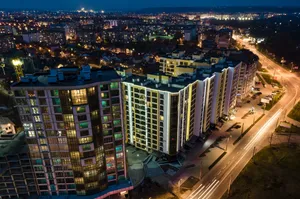Turkey's vibrant culture, stunning landscapes, and expanding economy have made it an increasingly popular destination for expatriates who dream of living in a country that bridges Europe and Asia. One crucial aspect of expat life in Turkey involves understanding the property market, either for investment purposes or to find your ideal home. In this comprehensive guide, we aim to provide invaluable insights and practical advice for expats delving into Turkey's property market, ensuring they make informed decisions to achieve their real estate dreams.
To successfully navigate Turkey's property market, expats must first determine their eligibility for property ownership. Turkey has specific rules and restrictions governing foreign nationals' rights to acquire property. Understanding these regulations, along with any requirements for military clearance, is paramount to a successful transaction.
In addition, there is a diverse range of property types available in Turkey, from city apartments to rural villas and farming land. We will explore the advantages and disadvantages of various property categories to help guide expats in selecting the most suitable option to meet their personal circumstances and investment goals.
With a clear understanding of eligibility and property types, expats can confidently embark upon the property purchasing process. Our guide will cover crucial aspects such as finding a property that suits your needs, working with estate agents, negotiating prices, and finally, obtaining the property deed. We will also delve into the legal aspects of property transactions in Turkey, including the importance of hiring a solicitor to conduct due diligence, navigating property contracts, and obtaining necessary tax numbers for a successful property purchase.
Join us on this journey through the intricacies of Turkey's property landscape, empowering you with the information and resources needed to make a sound investment, secure the perfect home, and fully embrace the richness of life in this stunning, dynamic country.
Eligibility for Expats: Rules, Restrictions and Military Clearance
As an expat, before delving into the Turkish property market, it's essential to understand the regulations governing foreign nationals' property ownership. Thankfully, most nationalities, including citizens of the RU, UK, EU, and USA, are eligible to purchase property in Turkey, thanks to reciprocity agreements between countries. However, some regions in Turkey restrict foreign property ownership due to their strategic importance or unique zoning regulations.
Expats should also be aware of the requirement for military clearance for property purchases. Turkish authorities must check if the property you intend to buy is not in a prohibited military zone. While this process can take a few weeks, it is vital to ensure you can legally own the property and avoid complications later.
Types of Property: Apartments, Villas, Commercial Properties and Rural Land
Turkey presents a diverse range of property types to suit various budgets, lifestyles, and investment goals. Let's explore some common property options expats consider when purchasing in Turkey.
- Apartments: City apartments remain a popular choice, particularly in areas like Istanbul, Ankara, and Izmir. They offer modern conveniences, proximity to amenities, and, depending on location and age, potentially attractive investment returns.
- Villas: Expats looking for a more luxurious, relaxing lifestyle may prefer purchasing a villa in coastal areas such as Bodrum, Fethiye, or Antalya. These regions provide scenic beauty, combined with stunning architecture and potential rental income possibilities for investors.
- Commercial Properties: For business-minded expats aiming to generate a steady income stream, commercial properties such as restaurants, shops, and offices could be the ideal investment.
- Rural Land: For those seeking tranquility and a simpler way of life, rural land may be the perfect option. Turkey's vast countryside offers fertile farmland and spacious plots for building a home; however, it's essential to understand the specific zoning regulations for agricultural land before committing.
Property Buying Process: From House Hunting to Deed Acquisition
- Finding a suitable property: Begin your property search by researching online listings, local newspapers, or working with reliable estate agents who cater to expat clients. Make a list of preferences, such as location, property type, and budget, to narrow down the search.
- Arranging property viewings: Once you have identified potential properties, arrange viewings with the estate agent or owner. Ensure you thoroughly inspect each property and prepare a checklist of questions to ask during the viewing process.
- Making an offer and negotiating: When you have found your ideal property, make an offer through the estate agent or directly to the owner. It is common practice to negotiate on the initial asking price, so don't be afraid to haggle. Once both parties agree on the price, you can proceed to draw up a sales contract.
- Sales contract and deposit: A preliminary sales contract is drafted, specifying the agreed price, payment terms, and date of completion. Ensure a clause is included for military clearance. Both parties sign the contract, and a deposit, usually around 10% of the purchase price, is paid by the buyer.
- Military clearance and checks: The necessary details are submitted to the Land Registry Office, where they conduct the required military clearance and property checks. Once clearance is obtained, and no issues with the property are identified, the final stage of the purchasing process can proceed.
- Deed acquisition: In the presence of a sworn translator, the buyer, the seller, and a legal representative appear at the Land Registry Office to complete the property transfer. Once the remaining purchase amount is paid, a new deed (TAPU) with the buyer's name is issued.
Legal Aspects: Solicitors, Due Diligence, Tax Numbers, and Contracts
Expats should enlist the services of a solicitor to navigate the legal complexities of property transactions in Turkey. Your solicitor will conduct due diligence, including verifying the property's title, ensuring there are no outstanding debts, and confirming the property complies with local laws and regulations.
Ensure you obtain a Turkish tax number before purchasing property, as it will be required during the process. This can be obtained at the local tax office by providing your original passport and a notarized copy.
It is also essential that expats thoroughly review the property contract before signing – preferably with the assistance of their solicitor – to safeguard against potential disputes and ensure a smooth transaction.
Financing and Taxes: Mortgages, Property Taxes, and Fees
Expats have the option of financing their property purchase through a mortgage. Some Turkish banks offer mortgages for foreigners, usually covering 70-75% of the property's value. However, interest rates may be higher than in your home country, so it's crucial to compare various lenders before making a decision.
Lastly, be prepared for property-related taxes and fees in Turkey, such as stamp duty, annual property tax, and capital gains tax if you sell the property within five years of purchase. These costs may impact your overall budget and should not be neglected during your decision-making process.
Conclusion
Understanding and navigating the Turkish property market is vital for expats looking to make a smart investment or establish their dream home. By grasping the intricacies of eligibility rules, property types, the purchasing process, legal aspects, and financing options, expats will be well-prepared for success in Turkey's diverse and exciting property market. Ikamet is here to be your reliable online resource for expats living in Turkey. Check out our latest posts today!
Which Istanbul districts will not be eligible for Turkish residence permits in 2023?
The following districts in Istanbul are closed: Esenyurt, Fatih, Küçükçekmece, Başakşehir, Bağcılar, Avcılar, Bahçelievler, Sultangazi, Esenler, and Zeytinburnu.
What is the minimum property price in Turkey?
Invest in Turkish real estate to secure a residence permit or citizenship. Minimum property value for a permit is $50,000 but rises to $75,000 in metropolitan cities like Istanbul, Antalya, and Ankara. Purchase must occur between April 26, 2022, and October 16, 2023. After this date, the minimum value increases to $200,000 across all cities.
How much does property cost in Turkey?
The average price per square meter of residential real estate in Turkey reached $675 in October 2022, and the average cost of a house was $87,736. Residential real estate increased in price by 199% year‑on‑year, while the return on investment period grew up to 19 years.












Member discussion